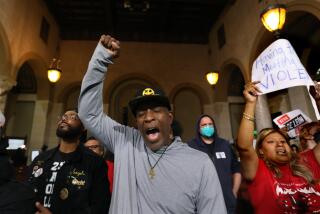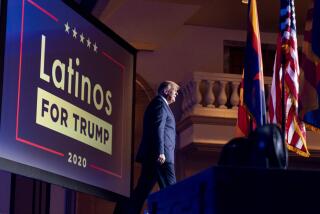Kosovo Factions’ Differences Apparent at Council Meeting
- Share via
PRISTINA, Yugoslavia — Leaders of Kosovo’s bitterly divided ethnic and political factions sat down here Saturday at one table, along with top U.N. and peacekeeping officials, for a key meeting aimed at building a new political structure in the province.
The Kosovo Transitional Council, consisting of United Nations-appointed representatives of every major ethnic and political faction in the province, will exercise “executive power shared between the U.N. and the people of Kosovo because this is my mandate and this is their future,” Bernard Kouchner, chief of the U.N. mission here, declared after the meeting.
“Not only it is going to function, but it has functioned,” Kouchner said of the fledgling council. “Division is part of democracy. When there is no division, there is no democracy, but dictatorship. People are not obliged to think exactly the same thing to work together. . . . We will try.”
The council met once before, in mid-July, but that meeting was boycotted by moderate ethnic Albanian leader Ibrahim Rugova, president of the Democratic League of Kosovo, who said his party had too little representation.
Rugova, who attended Saturday’s meeting, said after the three-hour session that he is still “not satisfied” with the level of representation of his party, which has two seats on the 12-member body. But, he added: “I don’t like to make problems, because [the council] needs to work. I came to represent my people because they like and trust me.”
Kosovo--still technically a province of Serbia, Yugoslavia’s dominant republic--will have an autonomous government after elections are held next year, but the council will play a major role in its political structure until then.
Because there continue to be a significant number of ethnically motivated killings of both Serbs and ethnic Albanians in the province, Saturday’s meeting focused mainly on security, while another major topic involved the effort to get a U.N.-led administration up and running, participants said.
Council members who spoke with reporters after the meeting portrayed it as useful despite sharp differences of opinion.
“We will work together for solving all the problems,” Rugova said. “We have problems, but the big issue is solved: Kosovo is free.”
Kosovo Liberation Army leader Hashim Thaci failed to show up for the meeting. But Thaci, who is also prime minister of the KLA-dominated provisional government of Kosovo--a self-declared unofficial body boycotted by Rugova’s party--sent his chief of staff, Bilall Sherifi, in his place.
If the Kosovo Transitional Council emerges as an influential and broad-based executive force capable of exerting its will in practical administrative matters, that could undercut the influence Thaci’s provisional government is trying to exercise. His absence, however, did not appear to be a fresh boycott from a new side.
Kouchner said that the council is scheduled to meet again Wednesday, with Thaci present, and that the rebel leader was simply out of the country Saturday.
“He phoned me yesterday [and] apologized,” Kouchner said. “It was not against anybody and not a breaking of anything.”
The continuing threat of violence directed at the province’s remaining Serbs was the principal focus of the meeting. Of the 200,000 Serbs estimated to have been living in Kosovo before fighting began last year, less than 20,000 are believed to remain. Killings of Serbs have been reported by peacekeeping forces recently at a rate of about one or two a day.
“We are not satisfied with the current situation,” Serbian Resistance Movement leader Momcilo Trajkovic, one of two Serbian members of the council, said after the meeting.
Trajkovic said he had urged the council to consider “cantonization” of Serbs in Kosovo, meaning that they would be protected in various enclaves and that those who have fled the province could return to those enclaves. This proposal would include the rebuilding of Serbian villages that are now empty, he said.
“This doesn’t mean partition of Kosovo,” Trajkovic said. “This is only a way to stop the tragedy of Serbs because otherwise we’ll have an ethnically cleansed Kosovo and it will not be good for Albanians, for Serbs, for anybody. The cities have to be multiethnic societies, and the villages have to be the same ones we had before the bombing.”
Bishop Artemije, who as a leader of the Serbian Orthodox Church is the other Serbian member of the council, also stressed the “cantonization” theme in remarks to reporters.
“It is impossible to have a multiethnic Kosovo if all the Serbs are gone,” Artemije said. “So in order to even talk about a multiethnic Kosovo, the Serbs have to come back. The way to do it is through cantonization of Kosovo.”
Artemije also stressed that this does not mean partition “because Kosovo belongs to Albanians and Serbs--not only to Albanians and not only to Serbs.”
Rugova, however, indicated that he considered the idea a nonstarter.
“We don’t have any Serbian region to cantonize,” he said. “It was presented, but . . . in principle I don’t accept it. It’s not good for Serbs also. We like democracy in Kosovo.”
Veton Surroi, an independent publisher and political activist who is on the council as a representative of ethnic Albanian political opinion that falls between the Thaci and Rugova camps, said the meeting was generally good, but he lamented that “we’re still confronted with a lot of political statements.”
“I wish it had a more businesslike atmosphere,” he said.
Trajkovic said he was satisfied by the meeting.
British Lt. Gen. Mike Jackson, commander of the international peacekeeping forces in Kosovo, attended the meeting as an observer and a speaker, although not a formal member. Afterward, he said simply that it had gone “very well.”
More to Read
Sign up for Essential California
The most important California stories and recommendations in your inbox every morning.
You may occasionally receive promotional content from the Los Angeles Times.










